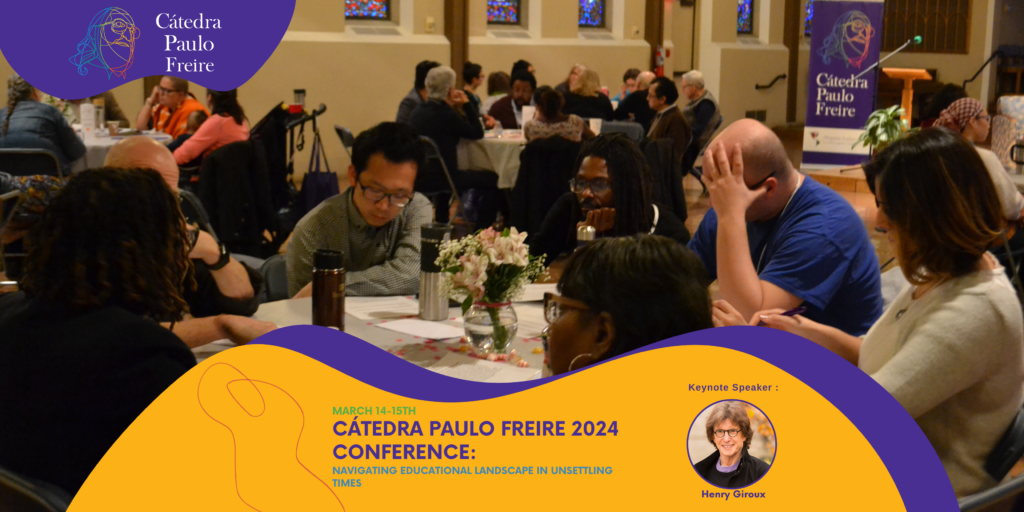Cátedra Paulo Freire 2024: Empowering Education for Everybody
March 14, 2024

by Jamie Stark
Book bans. The abolition of DEI programs. A fatal school culture for non-binary children. These horrors and more have become commonplace in contemporary American education. Set against this harrowing backdrop, Paulo Freire’s liberative pedagogy could not be more timely a tool to those building the alternative.
The Hispanic-Latinx Center’s marquee event, Cátedra Paolo Freire March 14-15, demonstrates a counter challenge to such ideologies, and models democratizing education, the heart of Paolo Freire’s work. It’s the first in-person Cátedra since the COVID pandemic.
“Paulo Freire was a trailblazing educator and leader whose work focused on transforming the reality and conditions that led to the creation of vulnerable peoples,” says Javier Viera, President of Garrett-Evangelical. “Freire’s work was deeply rooted in his Christian faith and practice, and this Cátedra is rooted in the same, as we honor his legacy we also continue his work.”
The seminar, hosted on campus and online this week brings students, faculty, and speakers to honor the legacy of Brazilian educator Paulo Freire, and practice what he preached: critical pedagogy, or encouraging students to examine power and inequality in pursuit of ending oppression.
“It is a real way to flip theological education on its head to say, students have something to teach too,” says abby mohaupt, Director of the Garrett Collective.
True to Freire’s emphasis on democratizing teaching, most of the speakers will be PhD students from Garrett-Evangelical, not just external experts.
“It feels Oscar-worthy, the people who come for this from the critical pedagogy world,” says third year PhD student Adriana Rivera. “As an emerging scholar, this is a great chance for me to debut my work and get feedback from the greats.”
Often higher education creates hoops and formalities for unheard or newer voices to get attention. Imagine the opposite, a Florida school system where marginalized students choose the books, and you’ve got a taste of the Cátedra’s purpose and process.
“We often think of PhD students as up and coming scholars, and the reality is they are already scholars who are trying to make sense of the world through their research,” mohaupt says. “That’s the ethos we’re building at Garrett, saying that theological education can and should be accessible to everyone. It challenges us to think about who gets to teach and who gets to learn.”
The keynote speaker, Dr. Henry Giroux, one of the foremost experts on Freire’s work, will lead discussion about education in times of increasing authoritarianism.
“This brings us to the heart of what Garrett is about, to be conscious about our mission in the world, to be critical about injustice, and to use our gifts creatively and courageously to change the things we disagree with,” says Garrett-Evangelical Professor Debora Junker, who chairs the campus Hispanic-Latinx Center and organized the event. She has been immersed in Freire’s work since childhood in her native Brazil, growing up in a state next to Freire’s hometown.
The event will end with a collective collage for everyone to participate in, painting what they learned at the Cátedra and combining group reflection into one public art piece. Hopefully that helps attendees leave with the strength and information needed to advance liberative thinking and acting in their work.
“Even if you’re not an educator, this is a great event because critical pedagogies affect how we live and how we exist together,” says Rivera. “The end goal of that is solidarity, liberation, it’s all these things we want to work for, especially if we consider ourselves people of faith.”

